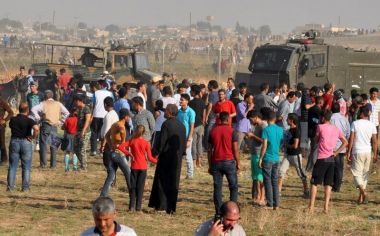Number of world's refugees soars to record-breaking 59.5 million in 2014

The year 2014 broke records on the number of internally displaced persons in the world as the figure skyrocketed to an all-time high of 59.5 million, with Syria becoming the number one source of refugees, according to the UN Refugee Agency's annual report.
Of the total figure, 38.2 million were forced out of their homes due to conflict, violence, and human rights violations, Foreign Policy reported, noting that this set a new world record since such data was first recorded in 1989.
Nearly 14 million were uprooted from their communities last year due to conflict and persecution.
Over half of the refugees worldwide were children.
Taken all together, the refugees would constitute the 24th largest country in the world.
Another grim figure: Only 126,000 refugees were able to go back to their home countries last year, the lowest in three decades.
Syria has toppled Afghanistan as the world's largest source of refugees. One of every four refugees comes from Syria where a civil war continues to rage after five years. By the end of last year, 7.6 million Syrians had been displaced within the country's frontiers. A total of 1.55 million fled the country last year, increasing the number of refugees to 3.9 million.
Surrounding countries have absorbed those who fled their own nations. With the Syrian crisis continuing, Turkey has become a shelter to the world's single largest refugee population of 1.59 million last year. Pakistan, which previously held the top post, came in second with 1.59 million refugees. Almost half of the 219,000 people who tried to cross the Mediterranean Sea last year were Syrians.
Although it has dropped to second place, Afghanistan is not showing any bright sign that the refugee crisis will get better in the future. The Taliban may boost its operations as the US is set to withdraw its troops and hand over the responsibility of security to the Afghan government.
All together, Syria, Afghanistan, and Somalia—the world's top three sources of refugees—contribute 53 percent of the world's refugees.
Refugee numbers in Iraq, meanwhile, worsened to 3.6 million, as 2.6 million were displaced following the terror campaign of the Islamic State.
In Pakistan, the government's offensive against Islamist militants have caused 283,500 people to escape to Afghanistan.
Another 137,000 Colombians have been displaced despite the government's peace talks with the FARC rebel group to halt the 50-year civil war, bringing the number of internally displaced persons to six million.
In South Sudan, 1.5 million have been displaced by the continued fighting. In neighbouring Congo, fighting has forced another million people there to move out.
Almost 230,000 fled to Russia with the ongoing conflict in Eastern Ukraine between government forces and Russian-backed rebels.
A Bloomberg report has noted the lack of action on the part of rich countries. The US alone hosts only 267,000 refugees, a tenth of Pakistan's or Turkey's. Rich countries should support the integration of refugees into the local economy instead of just staying in camps, and they can do so by bankrolling services and infrastructure of host countries, Bloomberg commented.
Industrialised countries should also spread the burden of refugees, it said.
"Alongside increased support to host countries, it would be an act of leadership that could help remove the global moral stain of permanent limbo status for some of the world's most dispossessed people," Bloomberg said.











